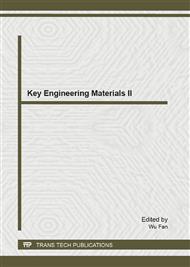[1]
Russell, R.H., A comparison of heuristics for scheduling projects with cash flows and resource restrictions. Manage. Sci., 32(10): 1291-1300, 1986.
DOI: 10.1287/mnsc.32.10.1291
Google Scholar
[2]
Russell, A.H., Cash Flows in networks, Management Science, 16(1970), 357-373.
Google Scholar
[3]
Elmmaghraby, S.E. and w. Herroelen, The scheduling of activities to maximizethe net present value of projects. Eur. J. Operat. Res., 49 (1): 35-49, 1990.
Google Scholar
[4]
Etgar, R., A. Shtub and L.J. LeBlanc, Scheduling projects to maximize net present value-The case of timeindependent, contingent cash flows. Eur. J. Operat. Res., 96 (1): 90-96, 1996.
DOI: 10.1016/0377-2217(95)00382-7
Google Scholar
[5]
Etgar, R. and A. Ahtub, Scheduling projects activities to maximize net present value-The case of linear time dependent, contingent cash flows. Int. J. Prod. Res., 37(2): 329-339, 1999.
DOI: 10.1080/002075499191797
Google Scholar
[6]
J.Blazewicz, J. K. Lenstra, and A.H.G. Rinnooy kan. Scheduling subject to resource constraints: Classification and complexity. Discrete applied mathematics, 5: 11-24, 1983.
DOI: 10.1016/0166-218x(83)90012-4
Google Scholar
[7]
Najafi A.A., Akhavan niaki S.T., Shahsavar M., A parameter tuned genetic algorithm for the resource investment problem with discounted cash flows and generalized precedence relations, Computers & Operations Research 36, 2994-3001, 2009.
DOI: 10.1016/j.cor.2009.01.016
Google Scholar
[8]
Narasimhan R., Goal programming in a fuzzy environment. Decision Sciences; 11:325–36, 1980.
Google Scholar
[9]
Tiwari RN, Dharmar S., Rao JR. Fuzzy goal programming -an additive model. Fuzzy Set sand Systems; 24:27–34, 1987.
DOI: 10.1016/0165-0114(87)90111-4
Google Scholar
[10]
R. Kolisch, A. Sprecher, A. Drexl, Characterization and generation of a general class of resource-constrained project scheduling problems, Management Science 41 (1995) 1693–1703.
DOI: 10.1287/mnsc.41.10.1693
Google Scholar
[6]
Vanhoucke, M; Demeulemeester, E; Herroelen, W; Scheduling projects with linearly time-dependent cash flows to maximize the net present value , International Journal of Production Research 39, 3159-3181, 2001.
DOI: 10.1080/00207540110056919
Google Scholar
[7]
Vanhoucke, M; Demeulemeester, E; Herroelen, W., On maximizing the net present value of a project under renewable resource constraints. Manage. Sci., 47 (8): 1113-1121, 2001.
DOI: 10.1287/mnsc.47.8.1113.10226
Google Scholar
[8]
Icmeli, O. and S.S. Erenguc, A branch and bound procedure for resource constrained project scheduling problem with discounted cash flows. Manage. Sci., 42(10): 1395-1408, 1996.
DOI: 10.1287/mnsc.42.10.1395
Google Scholar
[9]
Ulusoy, G. and L. Ozdamar, A heuristic scheduling algorithm for improving the duration and net present value of a project. Int. J. Operat. Prod. Manage., 15(1): 89-98, 1995.
DOI: 10.1108/01443579510077241
Google Scholar
[10]
Doersch, R.H. and J.H. Patterson, Scheduling a project to maximize its present value: A zero-one programming approach. Manage. Sci., 23(8): 882-889, 1977.
DOI: 10.1287/mnsc.23.8.882
Google Scholar
[11]
Baroum, S.M. and J.H. Patterson, The development of cash flow weighted procedures for maximizing the net present value of a project. J. Operat. Manage., 14(3): 209-227, 1996.
DOI: 10.1016/0272-6963(96)00005-8
Google Scholar
[12]
Pinder, J.P. and Maruchech, Using discounted cash flow heuristics to improve project net present value. J. Operat. Manage., 14(3): 229-240, 1996.
DOI: 10.1016/0272-6963(96)00003-4
Google Scholar
[13]
Herroelen, W.s., demeulemeester, E.L., De Reyck, B. "A Classification scheme for project scheduling problem" in: weglarz, j. (ED). Handbook of Recent Advances in project Scheduling, 1999.
DOI: 10.1007/978-1-4615-5533-9_1
Google Scholar
[14]
Vanhoucke, M, E. Demeulemeester and W.Herrorlrn, . An exact procedure for the resource constrained weighted earliness-tardiness project scheduling problem Ann. Operat. Res., 102:104-196, 2001.
Google Scholar
[15]
Vanhoucke, M. "Exact Algorithms for various types of project scheduling problem Non-regular objectives and time/cost tradeoffs" Unpublished Ph.D. Dissertation , Katholieke universiteit Leuven, 2001.
Google Scholar


